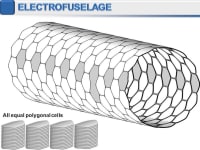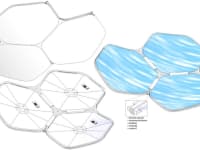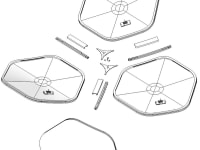Current structural architecture of composite aircraft fuselages, although more advanced, functional and lighter then metallic fuselages designed decades ago, still imply a set of important disadvantages and deficiencies from the perspective of fuselage design, manufacturing, testing, assembly, transport, maintainability, exchangeability, reusability, monitoring, etc. All these aspects together make aircraft fuselages still very costly, heavy, complex, with too many different components; facing both aircraft manufacturers and airframers, with too many risks along the whole life cycle.
Innovative method and construction principle for making cylindrical structures (with constant cross-section shape) or circular arcoids (structures with constant radius of curvature), like for example aircraft fuselages, rocket launcher fairings, etc., presented herein intends to overcome mentioned disadvantages and provide an elegant and attractive solution for design, manufacturing, assembly, maintenance and repair. Structures to be made by proposed construction principle need only one basic construction unit-element (substantially equal, in size and shape) named modular-cell, and at least three functionally different joining elements (where each one of the element type is substantially equal, in size and shape) in order to be assembled all together. By use of multiple modular cells (preferably all-composite) and three main proposed joining elements: electromechanical beam (preferably mixed composite-metallic), male and female electro-mechanical locks (preferably all-metallic), it is possible to easily assemble cylindrical structures (fuselages, fairings, nacelles, etc.) without need for any conventional rivets, screws and associated holes. Structural performance of such proposed architecture with multiple polygonal modular-cells is considerably higher than current mostly rectangular-cell structural architectures of fuselages, with evidences easily found in our rich nature. Having a fuselage structure standardized to only four main building units/components, means that design, manufacturing and many other related activities can be concentrated on only these components, eliminating the need to design thousands of different components, thousands of different manufacturing tools, thousands of different assembly rigs/tools. It’s clearly much easier, much cheaper, much more efficient to master the design, the manufacturing and assembly of four main building blocks, than thousands of all different components.
Compared with the traditional methods of building fuselages, structural architecture and principle proposed herein is aimed (mainly, but certainly not only) to considerably reduce initial investment costs and risks for aircraft manufacturers, to reduce acquisition costs of the final aircraft and corresponding direct maintenance costs for airline operators, providing thus an attractive margin to make an aerospace transport even more accessible for wider number of passengers worldwide. Many other additional advantages and benefits of the proposed "ELECTROFUSELAGE" design solution/principle (with all the functions and features) may easily become apparent to ones with skills in the art.
Like this entry?
-
About the Entrant
- Name:Valerijan Cokonaj
- Type of entry:individual
- Software used for this entry:CATIA 5
- Patent status:none








